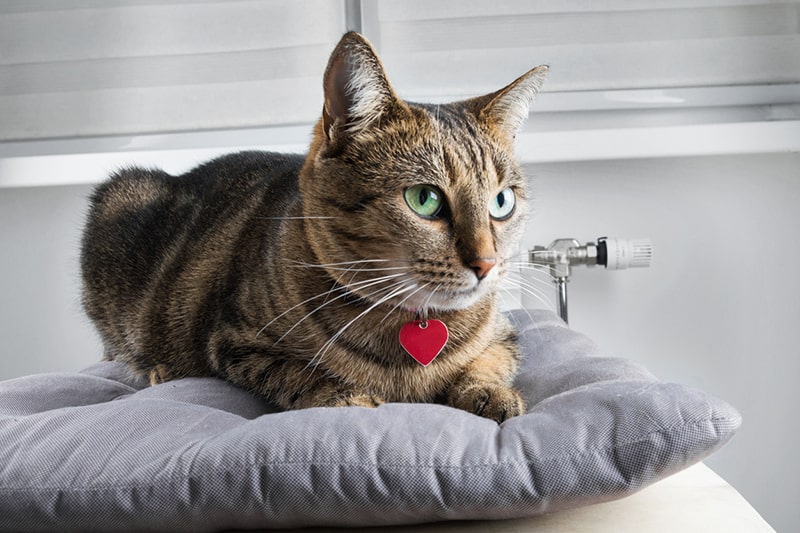Like people, pets can suffer from heart disorders. However, they aren't susceptible to coronary artery disease (where plaque builds up in the arteries of the heart) that commonly affects humans. Instead, they're prone to heart disorders such as cardiomyopathy and valve disease.
Structure of Your Pet's Heart
Your pet's heart controls blood flow throughout the body and has a four-chamber structure, like our own hearts. It has two upper chambers called atria and two lower chambers known as ventricles. Here's how they work:
- Blood flows through your pet's body and enters through the right atrium.
- It's then pumped to the right ventricle, which sends the blood to the lungs for oxygen.
- From the lungs, the blood flows back through the left atrium and into the left ventricle.
- The left ventricle is the largest muscle of the heart, and it pumps the oxygenated blood out and back through the body.

Types of Heart Disorders
Pet heart disorders are categorized into two different types:
- Acquired heart disorders develop during the course of a pet's life either as part of the aging process or due to issues, such as an infection. Two common acquired disorders are cardiomyopathy, which is a thickening or stretching of the heart walls, and valve disease where the valve becomes thickened or irregular causing it to leak.
- Congenital heart disorders are conditions present at birth. Some heart defects can be detected when the pet is very young while others may not show symptoms or be diagnosed until later in life. Congenital disorders are seen less frequently than acquired ones.
Congestive Heart Failure
When the heart is not working properly because of a congenital or acquired disorder, congestive heart failure can occur. This is where the heart fails to pump blood effectively throughout the body, causing blood to back up into either the lungs or backwards into the main body circulation.
This causes fluid to build up in the body, particularly in and around the lungs and in the abdomen. Congestive heart failure is an emergency and requires immediate lifesaving treatment, so it's important to know the signs.

Signs of Congestive Heart Failure
Fluid build-up caused by congestive heart failure can make it difficult for pets to breathe. They may exhibit noisy breathing, excessive panting, and bluish gums. Other signs include:
- Coughing – Dogs who are having trouble breathing may develop a persistent cough, which tends to worsen when they're laying down or at night when they're going to sleep.
- Vomiting – Cats usually don't cough, but they may experience gagging and vomiting in response to respiratory distress.
- Abdominal swelling – Excess fluid in the abdomen can give your pet a potbellied look. This symptom is more common in dogs than cats.
- Fainting – Seeing your pet collapse can be very scary. If your pet faints, try to remain calm and seek medical attention immediately.
- Behavioral changes – Congestive heart failure and heart disorders in the earlier stages can cause shifts if mood or behavior, such as lethargy, restlessness, or exercise intolerance. For instance, a normally energetic dog may tire out after a relatively short walk.
- Loss of appetite
If you suspect your pet is experiencing congestive heart failure, you should take them to the veterinarian or an emergency animal hospital immediately.
Diagnosis and Treatment
Diagnosing a heart disorder requires a full physical exam, including checking your pet's blood pressure and listening for abnormalities, such as a heart murmur or lung sounds (crackles) that can indicate fluid build-up, with a stethoscope. Blood and urine tests may also be performed. Other possible tests, some of which may need to be done at a veterinary cardiologist, include:
- Chest X-rays – X-rays can help determine if the heart is enlarged or fluid has built up.
- Electrocardiogram – This test analyzes the heart's electrical currents to help detect any rhythmic abnormalities.
- Echocardiogram – An echocardiogram is like an ultrasound of the heart. It can show the heart's dimensions, thickness of the muscle walls, valve structure, and how well it is functioning.
Treatment will depend on the type and severity of the condition. For example, surgery may be recommended to put in a pacemaker to help regulate the heart's rhythm.
If your pet has congestive heart failure, treatment will focus on eliminating fluid build-up through diuretics and reducing the heart's workload with medications. Congestive heart failure can't be cured, but these medications can help improve quality of life.

Heart-Healthy Diet Tips for Pets
Pets with a heart disorder may not eat as much or as often as usual, which can cause weight loss and reduced muscle mass. Your veterinarian can suggest ways to encourage them to eat such as:
- Offering your smaller meals more often throughout the day.
- Testing out different food temperatures. Cats tend to like their vittles warmed up, while dogs might like their meals warm, cold, or at room temperature.
- Enhancing the flavor of their food with natural ingredients. Cats may like a drizzle of tuna water or small bits of unsalted cooked meat on their regular cat food. Dogs may enjoy a dash of something sweet, such as applesauce or honey.
If you have an overweight or obese pet with congestive heart failure, your veterinarian may put them on a safe weight loss program. Losing weight can help them breathe with less difficulty, feel more comfortable, and avoid additional health issues, like arthritis and diabetes.
Dietary Changes
If your pet has a heart disorder, your veterinarian may recommend certain diet restrictions or supplements to support heart health. For instance:
- Sodium: Pets with a heart disorder may need to reduce their sodium intake since it contributes to fluid retention. Your veterinarian can suggest a low-sodium dog or cat food. Store-bought treats can also contain high amounts of sodium, so be sure to read the labels or consider making homemade goodies for your dog or cat.
- Omega-3 Fatty Acids: Omega-3 fatty acid supplements may be beneficial, especially if your pet is not eating well or shows signs of muscle loss. Make sure your veterinarian explains the type of supplement and dosage appropriate for your pet.
- Taurine: Taurine is an amino acid, which helps build protein in the body. A taurine deficiency can lead to an enlargement of the heart called dilated cardiomyopathy. It is more prevalent in cats since they can't produce taurine in their bodies as readily as dogs (for this reason, it's typically added to "complete" cat food brands). However, dogs on vegetarian diets or breeds, including Newfoundlands and Cocker Spaniels, may experience a taurine deficiency.
Remember not to make any dietary changes or give your pet supplements without consulting with your veterinarian. It's important to know if they're effective and understand how much you should give them.

Exercise Tips for Pets with Heart Disorders
Exercise is important for the physical and mental health of any pet. However, pets with a heart disorder may need to avoid strenuous exercise. Talk to your veterinarian about how much activity is safe for your pet.
Also, keep an eye on them when they are active for signs of overexertion, such as excessive panting. If you suspect your pet is overdoing it, have them take a break and give them some time to rest.
Veterinary Care and Heart Health
Regular check-ups give your veterinarian the opportunity to assess your pet's heart health on an ongoing basis. They can listen to your pet’s heart for any abnormalities and help track their weight so you can intervene early if there are any issues.
Your veterinarian can also test for heartworms and may recommend heartworm preventative medication if your pet is at risk. Heartworm Disease is a very serious but preventable problem that can affect both dogs and cats.
If your pet has congestive heart failure, your veterinarian may suggest more frequent visits. This allows them to monitor your pet's condition and manage medications more closely.
Stress and Heart Health
Stress can take a toll on a pet’s health, just like it can with people. Pets with a heart disorder can be especially sensitive to things like a change in routine or noisy visitors. Of course, it's not always possible to avoid potential stressors. However, you can help your pet relax by giving them a cozy place to retreat when they need some downtime.
You should also make sure you give your pet lots of love and cuddles. This can help lower stress for the both of you!
The information presented in this article is for educational and informational purposes only and does not constitute or substitute for the advice of your veterinarian.







